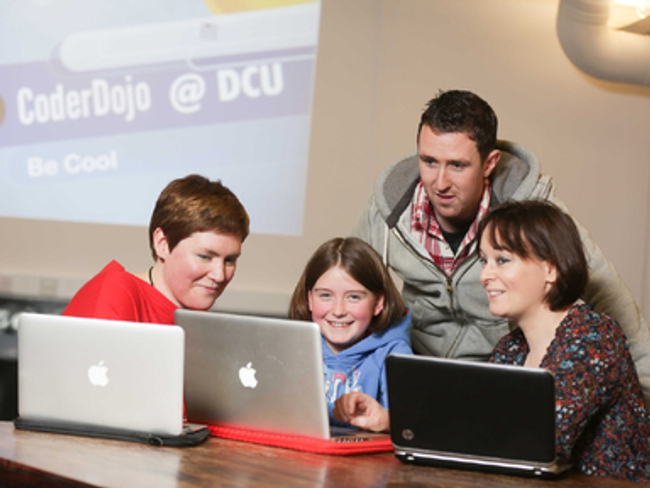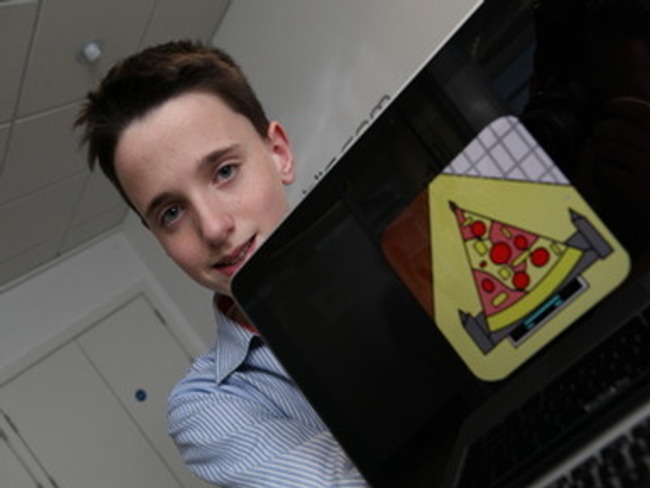Once known as the land of saints and scholars, Ireland is rapidly earning a reputation as the land of ‘coders and scholars’. We spoke to three young Irish coders – Niamh Scanlon, Jordan Casey and Harry Moran – about how critical coding skills are to people’s future lives and careers.
Since the first CoderDojo in Cork, Ireland, two summers back, the organisation has swept the world with dojos sprouting up in New York, London, Paris, Tokyo, LA, the Caribbean, Africa and Australia.
On any given Saturday, as many as 16,000 kids in 26 countries gather to learn skills and abilities that will stand to them in the 21st-century economy.
Here we spoke to 11 year-old coder Niamh Scanlon and 13 and 15 year-old coders Jordan Casey and Harry Moran about what attracted them to coding and how they see it affecting the lives of millions of young people in the coming decade.
Niamh Scanlon (11)

(From left) Claire O’Connell, Niamh (11), and CoderDojo mentors Noel King and Niambh Scullion. Photo by Conor McCabe Photography
Niamh Scanlon is in the vanguard of a new coder movement where the coder does not only creates apps and games but also facilitates and inspires other young people who wish to learn how to code. As well as learning how to code she mentors other kids at CoderDojo on Saturdays. Her site Learntocode.eu is a new initiative that will allow young coders from around Europe to share code and learn from each other.
“My mum heard about Coder Dojo and I said I would give it a try,” explains Niamh. “After that I kept going back because I loved it. It was a different way of learning, more hands on, you could do more things.”
From the offset Niamh wanted to teach others how to code. “I was thinking about when I started coding and how I could help people that were at the beginning. Also we were doing our Coolest Projects and I wanted to link that with helping people who were starting code.
“I thought about making a website – we had been making websites in CoderDojo so I made one called Inspire because it was trying to inspire people with code.
“I felt really happy that learntocode.eu was being set up based on my site, the idea had gone all over Europe and people could use it, I was really excited about it.”
Witnessing the success of movements like CoderDojo, Niamh believes Ireland is primed to ignite a coding revolution amongst its young people. “I think that revolution has already started!”
Niamh believes coding will be a vital skill for anyone to have, no matter what their career or educational background is. “It’s a handy skill to have. If you are running a business, then instead of needing to ask other people all the time about how a website is working, you could code it yourself and you would be able to understand what goes into it and fix it if needed.
“Plus I think if you learn to code, even if you don’t go on to be a coder, it will still help you think about problems in different ways.”
Integrating coding into the Irish education system is a worthy objective, she says. “Yes, I definitely think we should learn to code in school. But it is also important to have CoderDojos outside of schools, because you can do things in a different way there.”
Looking to 2014 Niamh already has a set of projects to occupy her time. “I hope to code more on the games side of things in 2014. And I hope to learn more new code in CoderDojo. Plus now that I am a mentor I hope to teach loads more kids to code.”
Harry Moran (15)

Fifteen year-old app developer Harry Moran shot to fame almost two years ago as the world’s youngest Mac app developer when his game PizzaBot went to the top of the app charts.
Harry learned how to code at CoderDojo in Cork within just a few months in 2011 and by November of that year his game PizzaBot quickly surpassed Angry Birds and Call of Duty to make it to the top of the Mac App charts.
Earlier this year he brought out a new iOS game called Robot Run! which went into the App Store.
“I’ve always been interested in coding, computers and stuff like that, but I had very limited access to them until I was 11. I feel that Coder Dojo really opened my eyes as to how easy it was to create software.”
While he quips it was his love of pizza that inspired him to create a video game, the learning environment at CoderDojo was integral to his ability to grasp coding. “I think it really is, because if you go to a CoderDojo, the rate people progress at is really impressive. The average amount of languages people know in many dojos is probably at least three, with many people programming at a very advanced level. Whoever hires these kind of guys are going to be very lucky.”
Like Niamh, he believes coding skills will be critical for securing employment in the coming decade. “Well the tech sector is, and has been, growing at a huge pace, with many of the larger companies such as Facebook, Twitter, Google and Apple setting up in Ireland. I think that as more services move towards adapting to platforms such as Android and iOS, programmers will be in more demand in order to port these services.”
As a secondary school student Harry wishes that coding would be taught in Irish schools. “I think that it really should be, as tech literacy is really not being taught effectively in the current education system. Many schools don’t have programming courses, and even if they do, they only take place in transition year, and only teach basic languages like HTML and even Scratch (which was designed to teach 7-9 year olds the basics of programming). I don’t see it happening any time soon, but I think it would be a very good idea to integrate coding into the education system.”
Looking to 2014 Harry predicts a broader canvas in terms of new devices for coders to express their skills. “Well, next year I hope that Google will launch Glass (which is really cool) in the consumer market, I hope Apple finally get somewhere on their TV, and I really hope that the PlayStation 4, PS Vita and XBox One get more independent developer-friendly (although they already are pretty good).”
Jordan Casey (13)

Jordan Casey, the 13-year-old entrepreneur whose video games went to the top of various app charts and who is busy building a virtual world for kids, first came to our attention two years ago when he published his first game, Alien Ball Vs Humans on the Apple App Store.
He has since been on the conference circuit, speaking at various events, from TED Talks to the Cannes Lions Festival for Creativity in Communications last year, as well as speaking to leaders and entrepreneurs in Germany and India.
Earlier this year the Waterford teenager addressed the titans of Silicon Valley at TiEcon in California, one of the world’s largest conferences for entrepreneurs.
“I started coding when I was 9. What attracted me was when I was playing a game called Club Penguin I saw a lot of the users were making websites about it and I thought it would be fun
“After my websites, when I started tapping into games, my real ambition was to make something like Club Penguin, I then evolved into mobile games. But what wanted me to do it as a business was when I was at a conference and heard about the advantages of starting young.”
Jordan says the success of movements like CoderDojo have put Ireland on the map in terms of not only inspiring the love of learning a vital skill that unlocks imagination, but for creating a template for learning in a relaxed, social way.
“I think Ireland is definitely leading the way in terms of getting young people to code thanks these initiatives. It’s turned coding into a social hobby and pastime which is awesome!”
As a skill and a language to converse with Jordan says it is a no-brainer that parents should encourage their children to take an interest in coding and that introducing it to schools’ curriculum would be an inspired move. “This is because technology is the future of everything. Nearly every type of career or industry has been changed for the good part thanks to technology, and most of that is powered by coding and there’s so much more to come!
“Again, technology is the future and as we know the amount of vacant jobs in technology and coding is huge and I think that’s because not a lot of people are introduced to it at an early age. And just like every type of language, I think it can be a bit intimidating for people who go on to learn at a later age. So, to introduce it into the education system I think would be a very important step.”
Looking ahead to 2014 Jordan wants to continue to pursue his entrepreneurial goals.
“For the new year I’m going to continue working on my businesses, particularly TeachWare and I just hope it all turns out well.
“I think for my tech predictions that wearable technology will be big this year. It’s something that really interests me and I can’t wait to see how they change the tech industry.”
Start coding image via Shutterstock